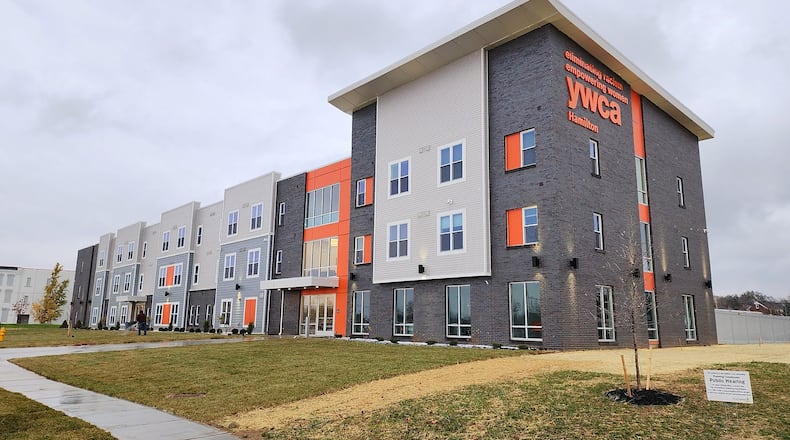Mayor Jewel Hensley told the Journal-News while she is a domestic violence survivor herself, she felt she had no choice but to withdraw her support for locating the project in the village because residents have been very vocal. She said she told YWCA Executive Director Wendy Waters-Connell, “our residents do not want this.”
Credit: Nick Graham
Credit: Nick Graham
“It was with a heavy heart that I made that big decision, my heart goes out to them,” Hensley said. “But with the feedback that we’re getting from our residents, as mayor I’ve got to put our residents first and I’ve got to put my feelings to the side and put our residents first. Don’t know if it’s going to do any good, our attorney is looking into the aspects of the contract. But I wanted to let the residents know hey I heard you, I’m going to be your voice.”
Waters-Connell is trying to cull a highly competitive Low Income Housing Tax Credit for $10.8 million from the Ohio Housing Finance Agency, but without it the project can’t be built.
She told the Journal-News she completely understands Hensley’s position because there is a lot of “angst” in the village right now, but nothing has changed as far as the project itself is concerned.
“It does not mean anything legally at this point because we are in a bound contract with the village,” she said. “Part of the conversation candidly last night during the council meeting was lets just let this ride because we still are facing a very, very steep hill for this grant and the chances of it being funded are pretty low. There’s a lot of angst right now over something that may never come to fruition.”
Village Solicitor Jonathan Fox told the Journal-News he is still reviewing the contract to see if it can be broken as Hensley requested.
“There’s a lot of contingencies in the contract, but it’s primarily about them obtaining grants and funding,” Fox said. “My advice is we just wait and see if they get the funding.”
Penny Martin, director of Public Affairs for OHFA, told the Journal-News previously this year her agency was awarded a total of $34 million for 24 projects, but only $5 million — for three projects — of it was for “service enriched housing” which is the category the YWCA project fits into. They don’t have the amount available for next year yet.
There has been a lot of feedback about the proposal on Facebook with people expressing concerns about various issues, “I don’t see anything good coming out of this except for more strain on the school system and more crime, with no real solid police force to deal with it,” one person wrote. “Put something in there for the kids to enjoy.”
Former Mayor Stephanie Chandler said there has been a huge organized effort against the project but not just because of the proposed use of the property. She said people are upset they weren’t informed before the village council made such a huge decision. Plus the land — which was donated by Armco employees —was originally meant to be a park, regardless of the fact a previous administration allowed the Family Dollar to be built.
In addition it will be a drain on the village’s meager resources, “you’re filling up what little vacant land you have, adding residents and not resources or revenue, it just incredibly fiscally irresponsible.”
“I am not against the cause in any way shape or form, but as a public officials who are elected and entrusted with taxpayer funds to manage this town and our money appropriately, I just cannot wrap my head around how this even made it past the discussion,” Chandler said. “For a town where you are almost landlocked, there is no independent revenue sources and you are struggling to just stay fiscally sound, there is no revenue to made from this project.”
Waters-Connell said they won’t know if they’ll get the tax credit until June, so they are hoping to change minds in the meantime, by putting the YWCA Hamilton Good Neighbor Committee “in action.” The first meeting is Jan. 7.
“Given enough time and a chance to have intentional conversations about what this project can bring to the village, I am confident that we could help the villagers understand how important the project is to change the lives of generations of children forever,” she said.
The YWCA initially tried to build up to 37 permanent supportive housing units in Oxford but residents resisted. Waters-Connell said it appeared the Oxford city council was prepared to accept the project and grant necessary re-zoning but “it was the citizens that were not ready.”
Hensley said she doesn’t know if anything will convince some of the naysayers but she has even been verbally accosted while she’s been out and about in the village.
“My heart really, really goes out to these women but then on the flip side I have to be mayor and I have to respond to what the residents want,” she said. “I was hoping that with meetings and with committees we would be ale to educate and turn things around and people would get to where they would accept it but I’m the one who is getting attacked. Not nobody on council, it’s me they’re calling me out I feel like Michael Jackson, can’t even leave my house at this point.”
About the Author
